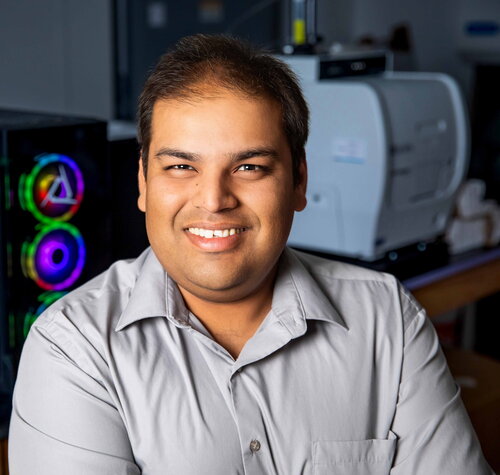
Contact Information
166 Roger Adams Lab, Box 67-5, M/C 712
600 S. Mathews Avenue
Urbana, IL 61801
Research Areas
Biography
Professor Mehta received his B.Tech. from the Institute of Chemical Technology in Mumbai and his Ph.D. from Texas A&M University. After his postdoctoral training at The Scripps Research Institute, La Jolla, Professor Mehta joined the University of Illinois faculty in Fall 2019. His research interests are in the areas of synthetic biology, synthetic immunology and chemical biology.
Research Interests
Key areas of focus: (i) directed evolution and synthetic immunology to combat emerging pathogens, (ii) directed endosymbiosis (an engineered, symbiotic cell within a host cell) to engineer artificial photosynthetic life forms for photosynthetic biosynthesis and evolutionary studies, and (iii) engineering selectivity in targeting cancer.
Research Description
Evolution serves as a powerful inspiration for synthetic biology. We use evolutionary observations to design synthetic biology approaches for answering fundamental molecular question in biological systems or for developing novel translational platforms for human health. Key areas in the lab include:
1. Directed evolution and synthetic immunology to combat emerging viruses: (A) Viral neutralization and stopping viral entry: Our adaptive immune system evolves antibodies in real time to combat threats associated with invading pathogens. Inspired by how our adaptive immune system evolves antibodies, we are developing novel continuous directed evolution platforms for evolving human antibodies and biologics targeting emerging pathogens (viruses, drug resistant bacteria) and cancer. To identify new starting points for antibody evolution, we are also developing single B cell sequencing approaches to obtain antibody sequences from zoonotic host reservoirs. Our studies could inform biologics development, vaccine design and diagnostics. (B) Targeting viral replication: During the course of evolution, viruses evolved to have an RNA cap structure that is chemically identical to the host mRNAs; essentially viruses mimic their genomes or transcripts as host mRNAs. These viral RNA cap structures are necessary for viral replication, translation and immune evasion. We are developing synthetic biology approaches to understand the molecular details of these essential viral enzymes. Further we are using a directed evolution to target these enzymes to systematically engineer attenuated variants and study the implication of these attenuated variants on viral pathogenesis. We are also using medicinal chemistry approaches to develop novel antivirals selectively targeting viral RNA capping enzymes over human RNA capping enzymes. We are expanding these approaches to combat human and animal viruses.
2. Directed endosymbiosis for evolutionary studies and synthetic biology: Endosymbiotic theory suggests that mitochondria and chloroplasts evolved from free-living prokaryotes which entered the host cell and were retained as endosymbionts; however, there is a minimal understanding of chloroplast evolved from cyanobacterial endosymbionts. We are developing synthetic model systems to study chloroplast evolution by generating cyanobacterial endosymbionts within eukaryotic cells. Our studies focus on studying various stages of chloroplast evolution including but not limited to (i) cyanobacterial endosymbiont genome minimization, (ii) engineer cyanobacterial endosymbionts to secrete photosynthetic end-products, (iii) develop strategies to facilitate protein exchange between the endosymbiont and host and (iv) mutation-based evolution and selection. These studies are expected to provide molecular details into the evolution of structure/function of organelles in eukaryotic cells. Synthetic Biology applications: These studies are providing us with a roadmap to build synthetic endosymbiotic systems for various synthetic biology applications. Engineering genetically tractable yeast/cyanobacteria endosymbiosis will be to generate "photosynthetic yeasts". This platform will couples the biosynthetic and biocatalytic potential of yeast to the photosynthetic ability of cyanobacteria; essentially the cyanobacterial endosymbionts will act as artificial chloroplasts for yeast cells. This platform will allow us harnessing light and photosynthesis to biosynthesize high value molecules like natural products, biofuels among others.
3. Engineering selectivity in targeting cancer: We are combining synthetic biology, synthetic chemistry and material science to develop fundamentally novel, modular platforms for selectively targeting cancers with defined biomarkers. We are using principles of directed evolution and biomolecule delivery platforms to engineer novel biologics that specifically target cancers where the biomarkers are well characterized.
Awards and Honors
(selected)
2025 Ono Pharma Breakthrough Science Initiative Award
2025 Sloan Research Fellow
2025 Windy City Innovation Award, CBC-HITES
2022 Teachers Ranked As Excellent
2022 T. M. Balthazor Faculty Scholar
2021 Scialog Fellow
2020 Moore-Simons Foundation Award
2014 Dow Chemical Scholar Award
Additional Campus Affiliations
Assistant Professor, Chemistry
T. M. Balthazor Faculty Scholar, Chemistry
Assistant Professor, Bioengineering
Affiliate, Chemical and Biomolecular Engineering
Recent Publications
Cournoyer, J. E., De, B. C., & Mehta, A. P. (2025). Molecular and biochemical insights from natural and engineered photosynthetic endosymbiotic systems. Current Opinion in Chemical Biology, 87, Article 102598. https://doi.org/10.1016/j.cbpa.2025.102598
Bram, S., Lindsey, G., Drnevich, J., Xu, F., Wozniak, M., Medina, G. N., & Mehta, A. P. (2024). Parallel single B cell transcriptomics to elucidate pig B cell repertoire. Scientific reports, 14(1), Article 15997. https://doi.org/10.1038/s41598-024-65263-2
De, B. C., Cournoyer, J. E., Gao, Y. L., Wallace, C. L., Bram, S., & Mehta, A. P. (2024). Photosynthetic directed endosymbiosis to investigate the role of bioenergetics in chloroplast function and evolution. Nature communications, 15(1), Article 10622. https://doi.org/10.1038/s41467-024-54051-1
Gao, Y. L., Cournoyer, J. E., De, B. C., Wallace, C. L., Ulanov, A. V., La Frano, M. R., & Mehta, A. P. (2024). Introducing carbon assimilation in yeasts using photosynthetic directed endosymbiosis. Nature communications, 15(1), Article 5947. https://doi.org/10.1038/s41467-024-49585-3
Ornelas, M. Y., Thomas, A. Y., Johnson Rosas, L. I., Medina, G. N., & Mehta, A. P. (2023). Characterization, Directed Evolution, and Targeting of DNA Virus-Encoded RNA Capping Enzymes Using Phenotypic Yeast Platforms. ACS chemical biology, 18(8), 1808-1820. https://doi.org/10.1021/acschembio.3c00243